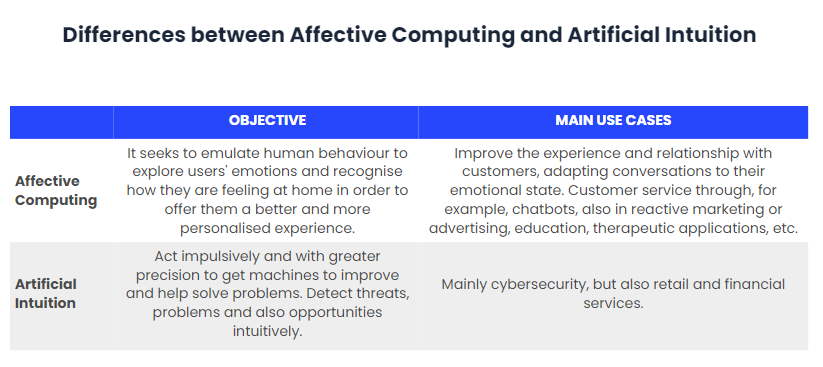Fourth generation of AI arrives: Artificial Intuition

Artificial Intelligence (AI) is one of the most effective applied technologies ever developed, changing the world and raising important issues for society, the economy and all governments.
AI algorithms make decisions based on real-time information and data collected from sensors and a wide range of sources. This information is analysed in a fraction of a second and tracked. With advances and improvements in storage systems, the speed of processing and analytical procedures is faster and more capable of advancing analysis and decision making.
These changes and the evolution of AI have meant that today we are in what is known as the third generation of Artificial Intelligence.
- The first generation of AI was Descriptive Analytics, which answered the question what happened?
- The second generation of AI was Diagnostic Analytics, which addressed the question why did it happen?
- The third generation of AI, and the current generation, is Predictive Analytics, which analyses historical and present data to answer the question what might happen next?
However, current AI and Machine Learning algorithms that focus on examining large amounts of data to identify patterns that allow them to make predictions and forecasts still rely almost entirely on historical data, leaving data scientists helpless when new situations or problems arise. AI technology is constantly advancing and changing, which increasingly suggests that true Artificial Intelligence requires machines that can think for themselves, especially when faced with a new situation.
It is this need that has led experts to predict the arrival of a fourth generation of AI that can examine the data on display, and express a “gut feeling” when something is wrong, doesn’t work or doesn’t make sense. This is an AI that can mirror human instinct by making deductions based on the analysis of information. This fourth generation is called “Artificial Intuition”.
What is Artificial Intuition?
Artificial Intuition allows systems to detect threats, problems, as well as opportunities without knowing what exactly they are looking for or being told what to look for, just as human intuition allows them to make certain decisions without being taught how to do so.
Based on the analysis of information and data, Artificial Intuition can sense that something is not working as it should, or it can detect a problem before it happens, or it can detect an opportunity that may be good for the company. For example, it can sense that a new cyber-attack will happen, even if all transactions appear to be “innocent”. To achieve all this, Artificial Intuition draws its knowledge from a variety of domains and technologies, such as computational neuroscience, linguistics, data science, computer engineering, Machine Learning, Deep Learning, Cognitive Analytics, RPA and bots.
These algorithms mimic the most powerful part of the human brain, that of common sense, instinct and intuition. This ability is similar to human intuition in that it can quickly assess the totality of a situation, including the most subtle, and often overlooked, indicators of a specific activity. On the other hand, it can be easy to confuse Artificial Intuition with Affective Computing, but they are two different trends.

Scientists are working with Artificial Intuition to enable machines to act impulsively and with greater precision in order to make them better and more helpful in problem solving. And while that intuition or hunch has been very difficult to quantify and translate into an algorithm, many are succeeding.
For example, researchers at MIT have, for some years now, been studying the intuitive problem-solving methods used by highly intelligent people, and implementing those strategies into software. By encoding these strategies in a machine-readable form, they were able to improve the performance of planning algorithms in solving a range of problems by 10-15%.
On the other hand, San Francisco-based startup Node, founded by a former Google employee, announced in 2019 that they taught a computer to have intuition, claiming that these computer-programmed intuitions can help business leaders make better decisions about the future, including making predictions. Node’s Artificial Intuition learns from the results it generates to improve, not just for every use case, but for every business and every user that leverages the platform.
Uses of Artificial Intuition
Although Artificial Intuition is not yet sufficiently advanced, the main fields that can benefit from this trend are cybersecurity, the financial sector, the retail sector and the pharmaceutical sector.
Cybersecurity
Machine Learning is currently used by organisations to identify patterns and outliers that represent potential threats and vulnerabilities. However, there are two persistent problems for cyber security providers: firstly, there is the high percentage of false positives that appear in the analysis. This can lead to what is known as ‘alert fatigue’ among cybersecurity managers, which means that a large number of false positives can cause them to overlook or even ignore an alert that is actually important and could be a real threat. On the other hand, the other problem is false negatives, which fail to detect unwanted behaviour.
Despite all the investments companies make in cyber security, they are often one step behind cyber criminals because some patterns are too subtle and imperceptible to detect.
It is precisely these subtle patterns that Artificial Intuition is able to detect, which identifies the weakest signals from the big data set, something that other approaches miss. In particular, the algorithms can identify new and previously undetected patterns, such as a cyber-attack occurring in what appear to be unimportant transactions.
Financial Sector
Experts believe that one of the most promising areas for Artificial Intuition will be in the financial sector, especially during the current COVID-19 crisis. The applications of this technology within the sector are diverse, but two main ones stand out. On the one hand, the ability of financial institutions to know and identify their customers has become more difficult, mainly because customer behaviour is constantly changing. In order to solve this problem, the implementation of advanced technology such as Artificial Intuition would be the solution.
On the other hand, the major use of AI in the financial sector is to detect fraud, cybercrime including money laundering, and ATM hacking. Cybercriminals are increasingly using AI to carry out financial cybercrime, so banks need a more advanced level of AI to detect and even prevent and defeat it.
Fraudulent transactions are typically hidden among hundreds of transactions, but have a number of common parameters, which, although very subtle, make them identifiable. Using mathematical algorithms, Artificial Intuition quickly identifies, with a high level of accuracy, the five most influential parameters and provides them to analysts. In 99.9% of cases, when the analysts see these five parameters, they can immediately realise what type of crime it is.
Retail and Pharmaceutical
In the retail sector, Artificial Intuition could be used to better understand the shopping behaviour of customers, both outside and inside physical shops, thus improving the accuracy of the replenishment of products on shop shelves by adapting to the needs and interests of consumers, and also improving the pricing strategy, making them more competitive. With this technology, retailers can also identify new market opportunities, they can even predict what customers’ needs will be in the future, and this will help them make investment decisions to stay ahead of the competition.
On the other hand, pharmaceuticals could use this technology to identify previously undetected patterns of drug contraindications. This could improve patient safety, as well as the safety of the company.
Conclusions
Artificial Intelligence has evolved tremendously since Alan Turing first introduced thought in 1950, and the pace of evolution is not likely to stop. However, what has happened so far is only the beginning of what is to come. With Artificial Intuition, the time will come when AI will definitely become “intelligent”.
AI makes intelligent decisions that are unique to each application, user and use case. Businesses can leverage this to improve cybersecurity, but also to accurately predict and find new, previously unexplored market opportunities that can give you the boost you need. This is the power of this technology, which basically turns data into decisions, both in a specific context, for example, in analysing an application; but also in learning from the intuition of end users to know what will be most successful in the future.
The world will witness a large AI network that will show intuitive and reasoning capabilities due to the vast amount of data collected. The next wave of innovation will come from the enterprise, so it would be wise to have Artificial Intuition technology to identify threats and problems as well as opportunities. However, the question now is whether AI intuition can be trusted?


